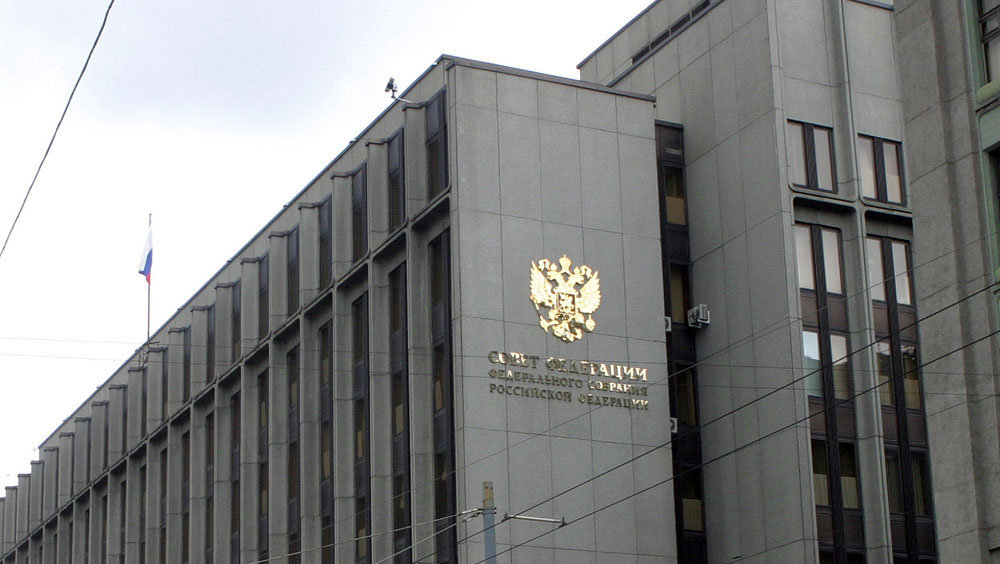MOSCOW, October 29 - RAPSI. The Federation Council Committee on Constitutional Legislation has approved the law on state treason on Monday and recommended that the council approve it during its plenary meeting on October 31.
Russia’s lower house, the State Duma, earlier adopted a law increasing the protection of state secrets, toughening punishment for their disclosure, and imposing criminal liability for illegally obtaining secret information. Committee member Yevgeny Tarlo told RIA Novosti that only five individuals were convicted under the law in its previous version.
Tarlo said he understands civil society's concerns regarding the adoption of the law on state treason, as "we remember Stalin's past." However, he added that in many world countries, including the United States, the punishment for disclosing state secrets is harsher.
The law will most likely be supported by the majority of the Federation Council, Tarlo said.
Russia’s parliament thus took the steps to pushing through a series of amendments aimed at expanding the scope of the Criminal Code articles at the heart of Russia’s national security legislation, those on high treason, espionage, and the disclosure of state secrets.
Common provisions
A couple of the proposed revisions span two or more of the articles at issue, illustrating a more generalized shift in Russia’s national security stance.
Most intriguing from an international standpoint is the inclusion of international organizations as among the sources whose illicit receipt of state secrets satisfies the elements of high treason or espionage, depending on whether such was at the hands of a Russian citizen or a foreign national. In their current forms, the espionage and high treason articles list only foreign states, foreign organizations, and the representatives of each as proscribed recipients. Speaking to this point at the Duma hearing last week, Gorbunov explained that international organizations, “are actively used as a cover and to independently conduct intelligence operations."
The current text applies to information constituing a state secret as obtained either directly by a trustee or indirectly in the context of one's office or work. The amendments propose including the context of one's education to the list.
The amendments seek also to alter slightly the language used in the articles on high treason and espionage to describe the danger posed by the information, aiming to broaden the focus of both from threats to the “external security of the Russian Federation,” to simply the “security of the Russian Federation.” According to Gorbunov, the former lacks a formal legal definition, whereas the latter is clearly defined. Thus the removal of “external” would remove the present threat of ambiguity.
Amendments to the treason article
The article on treason targets Russian citizens that provide assistance in support of foreign interests, to the detriment of Russia’s interests. Under the proposed amendments, this article would undergo arguably the most dramatic facelift. In addition to the changes described above, the amendments would more clearly - and incidentally, more broadly - define the harm and action elements of the current article.
In terms of harm, the current text merely prohibits the rendering of certain types of assistance if such would compromise Russia’s external security. The amendment would define this “security” as inclusive of Russia’s constitutional order, sovereignty, and territorial and state integrity.
The combined effect of the removal of the “external” qualifier (as described in the previous section) from Russia’s security, and the more specific definition would significantly broaden the range of activities that could fall within the scope of high treason. Most notably, seemingly internal affairs could qualify as treasonous if all of the other elements were satisfied.
In terms of action, the current text includes espionage, the disclosure of state secrets, and “any other” such assistance to proscribed recipients. The amendment retains the current language, including the “any other” catch-all, but adds financial support, the provision of material assistance, and consultation as specifically prohibited types of assistance.
The amendments retain the current sentencing structure of 12 to 20 years.
Amendments to the espionage article
The article on espionage targets foreign nationals and stateless persons that collect, steal, or otherwise possess state secrets or other information detrimental to Russian interests for foreign intelligence purposes. The amendments won’t drastically impact the espionage article beyond the common provisions described above.
While “external” would be deleted from the article’s reference to activities that threaten Russia’s security, the clause including constitutional order, sovereignty, and territorial and state integrity would not be added. Thus the focus would not be as actively internalized as it would be under the treason amendment.
The only other notable change would be the broadening of the class of beneficiaries of the illicit information to include persons acting on behalf of foreign intelligence services, rather than retaining foreign intelligence services themselves as the exclusive beneficiaries.
The amendments retain the current sentencing structure of 10 to 20 years.
Amendments to the state secrets disclosure article
The article on the disclosure of state secrets currently targets individuals that disclose certain privileged information to “other persons.” The amendments aim to add a new section to the article targeting these “other persons,” the recipients of state secrets.
The proposed section would criminalize the receipt of state secrets by means of theft, deception, bribery, blackmail, coercion, or threats of violence, and would impose a sentence of imprisonment for up to four years, or a fine ranging between 200,000 and 500,000 rubles, or the convicted person’s salary for between one and three years. Aggravating circumstances would include the commission of the same by a group of people, or if such were carried out violently, with serious consequences, of by use of special devices intended for the collection of secret information. Receipt of state secrets under any of these aggravating circumstances would be punishable with three to eight years of imprisonment.



